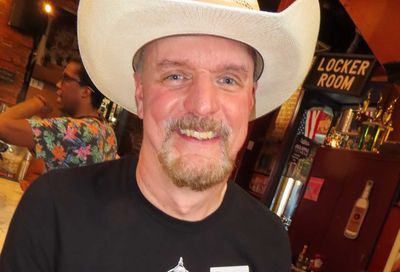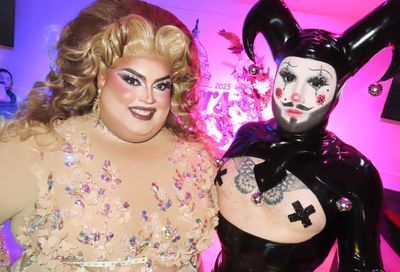Opinion: Working Together to End the HIV Epidemic in Virginia
Virginia seeks to repeal outdated and inequitable laws that unfairly criminalize people living with HIV. It's about time.

Our nation has a dark past of implementing laws that disproportionately impact individuals at the margins of society. I learned about these discriminatory laws firsthand through producing MILK, a biographical film about Harvey Milk, the first openly gay person elected to public office in California.
The film takes place in the 1970s and highlights Milk’s commitment to defeating Proposition 6, an initiative aimed at preventing gay and lesbian individuals from working in California’s public schools. The film also highlights Milk’s other fights for LGBTQ+ advocacy, including passing a bill during his short time on the San Francisco Board of Supervisors that banned discrimination in public accommodations, housing, and employment based on sexual orientation.
As history tells us, we know that Harvey Milk did not defeat propositions or pass bills alone – in order for these advancements for the LGBTQ+ community to take place, it took a village including everyone in the LGBTQ+ community and fellow allies to push for equality.
More than 40 years after Milk’s death, the same kind of collective action and commitment for change is needed on a new front: the fight to decriminalize the discriminatory and homophobic HIV laws that impact people exposed to or living with HIV/AIDS in 32 states across the US.
The HIV epidemic is a critical public health issue across the country, and current laws aren’t helping. Our nation’s top health and research institutions, including the Center for Disease Control and Prevention (CDC) and Williams Institute, agree that these laws are not helping and must change. A 2017 CDC study found no correlation between HIV diagnosis rates and the effectiveness of criminal exposure laws. In addition, while there is no national central reporting system on enforcement, the research we do have points to how people of color are harmed the most by these laws.
Furthermore, a report by the Williams Institute in California found that Black and Latinx people made up 67 percent of those charged under HIV laws in the criminal justice system, while making up only 51 percent of people living with HIV in the state. Yet another Williams Institute study in Georgia showed that Black men and women are significantly more likely to be arrested for HIV- related offenses than their white counterparts, and Black men are nearly twice as likely to be convicted than white men.

The situation is no different in my home state of Virginia. I am calling on people in Virginia to take up the fight to modernize these discriminatory HIV laws and act as a model for the other 32 states that continue to uphold these egregious laws.
According to the Virginia Department of Health’s most recent data, approximately 25,000 people live with HIV in the commonwealth. Data highlights that communities of color, LGBTQ+ individuals, people who use drugs, and sex workers are most likely to be impacted by HIV.
In addition, Virginia’s current statutes subject people living with HIV (PLHIV) to criminal prosecution and punishment on accounts of potential exposure, non-disclosure, or potential transmission of HIV. Criminalizing individuals living with HIV only fosters mistrust and anxiety towards law enforcement, the legal system, and PLHIV.
As a society, we know that it is easier to avoid conflict with the law or the healthcare system if we avoid – avoid getting tested, getting treatment, accruing criminal penalties, and importantly, avoiding stigma and mental health problems associated with having HIV/AIDS.
Senate Bill 1138 is a state-wide bill in Virginia that will repeal outdated and inequitable laws that unfairly criminalize people living with HIV, particularly the Black, transgender community. If passed, SB 1138 will set an example for other states.
The bill is making progress in Virginia’s legislature, but our work is not over. Last week, lawmakers passed an amended version of SB 1138 that includes a felony penalty, which means Virginians living with HIV could be penalized for up to five years in prison if charged. It’s critical lawmakers remove the felony penalty.
Criminal laws are not the answer to the current HIV epidemic. We must modernize these HIV laws and invest in care and services for people living with HIV.
My call to action is clear: As this year’s General Assembly session wraps up, I encourage you contact your lawmakers and demand that they pass SB 1138 without any felony penalties to ensure a more equitable and healthy state for everyone in Virginia. For more information, head to equalityvirginia.org.
Bruce Cohen is a film, television, and theater producer.
Support Metro Weekly’s Journalism
These are challenging times for news organizations. And yet it’s crucial we stay active and provide vital resources and information to both our local readers and the world. So won’t you please take a moment and consider supporting Metro Weekly with a membership? For as little as $5 a month, you can help ensure Metro Weekly magazine and MetroWeekly.com remain free, viable resources as we provide the best, most diverse, culturally-resonant LGBTQ coverage in both the D.C. region and around the world. Memberships come with exclusive perks and discounts, your own personal digital delivery of each week’s magazine (and an archive), access to our Member's Lounge when it launches this fall, and exclusive members-only items like Metro Weekly Membership Mugs and Tote Bags! Check out all our membership levels here and please join us today!

























You must be logged in to post a comment.